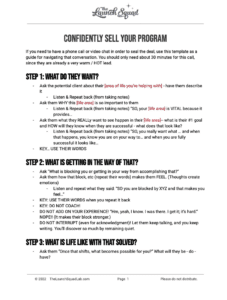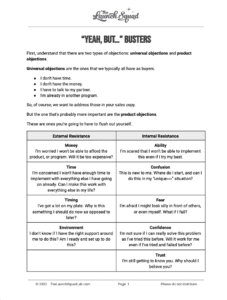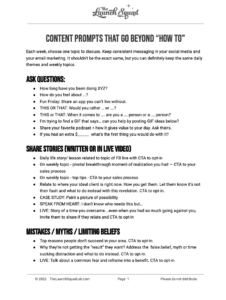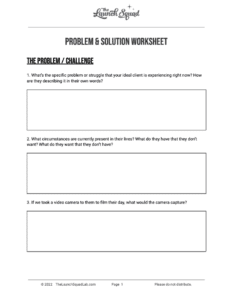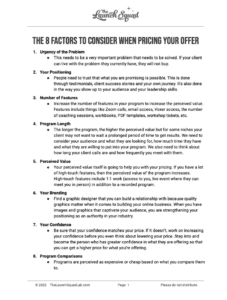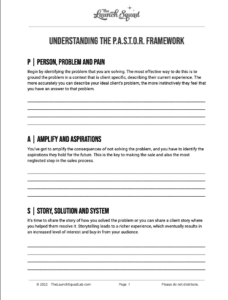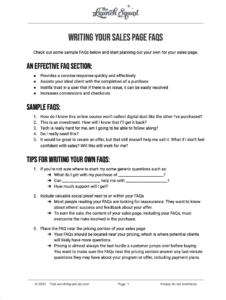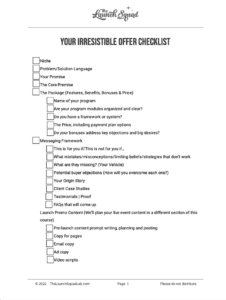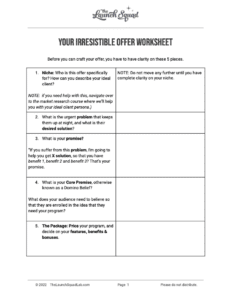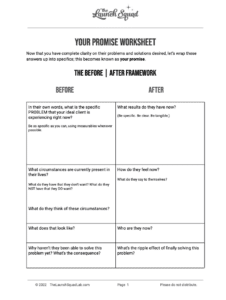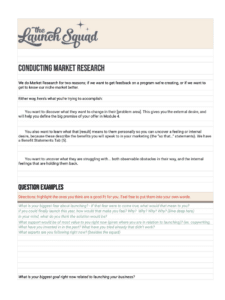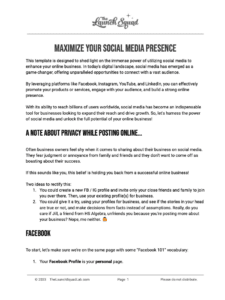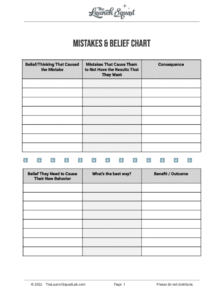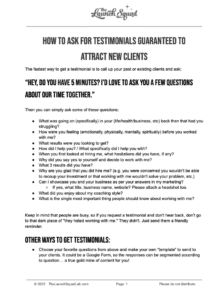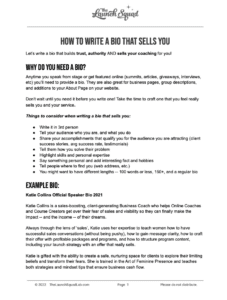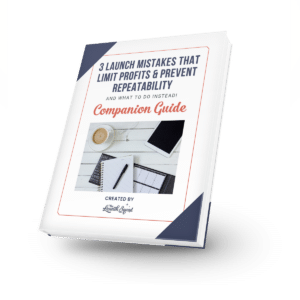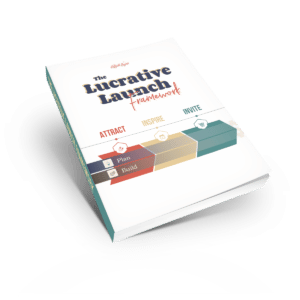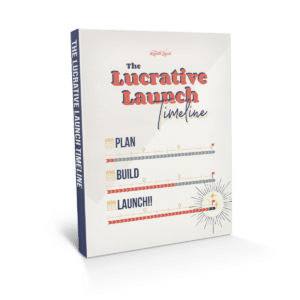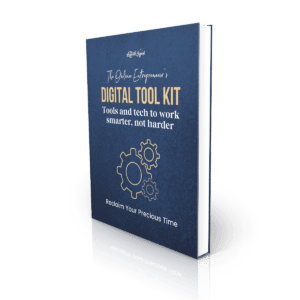Today we’re chatting about the word “avoidance” and how the little (or big) things you’ve been avoiding are having a significant impact on your success.
It’s completely normal to avoid doing certain things in your business. This is all too common. So we want to talk with you today and acknowledge some of the reasons why you may be avoiding important tasks in your business.
And since each squad member here has a different approach you may find something that resonates with you and gets you off the fence and into action!
Listen in and snag some key takeaways from a sales coach, tech advisor, and spiritual guide about how to get back into action mode when things feel overwhelming.
Jeffrey: Welcome to the light and your launch podcast today, we're talking about what you've been avoiding and how to stop avoiding it. Stay tuned.
Katie: Hi everyone. Katie here, here with Jeffrey and with the launch squad. And we were chatting about this in one of our team meetings, the word avoidance, and we may or may not have been talking about ourselves and each other, but the bigger thing that came up with. You know, it's so normal for everyone to avoid doing certain things in their business for different reasons.
And so we wanted to come to you today and just acknowledge, um, some of the reasons why we may be avoiding things. And then what each of us recommends, because we all have a different approach and sometimes people vibe with one approach over the other. And so we just thought it would be more exciting to comply with.
Gather as a team and chat about this very important topic that not one human being can avoid.
I know I'm a total dork.
Um, all right, so, so we talked about like three things.
Around avoidance. Like we tend to avoid things that feel hard, whether we know it's going to take a lot of time and that feels, um, hard. You know, so we avoid things that feel hard.
We avoid things that we don't know. Um, how to actually do it. Like it's like before I can do what I have to learn about it, I'm in the midst of that right now. Um, and then we. I think avoidance gets expressed through complaining. Like you avoid doing something by complaining instead about what's not working.
And, you know, so we spend, you know, 5, 10, 15 minutes complaining and in effect we're avoiding doing the work that we're. We doing. So those are some of the things that came up. So if you, uh, if you totally hear that and you know, that's true for you, whether you're here live or on the replay, you know, put a comment in there that says like, that's me, because I know that's me.
So I'll say it again. I think it's U2 too. Would you agree?
Jeffrey: No,
Aleyah: I complain as much as I like list out reasons why it's not a good time or something like that, which I think is similar, but like my mind will have reasons, you know, Lola XYZ, why I can't get that done right now. There's so many things around this topic.
I could talk about this for like two hours.
Jeffrey: Yeah. And that's really the insidious part of it is like we have in our minds completely rational and valid reason. Why we shouldn't get to that or why we shouldn't do that or why we can avoid things. And that's the hardest part it's like, well, yeah, yeah, yeah.
I don't know that yet. So I'll put that off
Katie: that thing.
Jeffrey: Now's not the time, right?
Katie: Yeah. Yeah.
Aleyah: Like, so pictures to getting our pictures done the other day. You know, like I keep thinking, oh, I'll get a good night's sleep, but I'm going through like, pre-menopause right now, which is a real thing when you're turning 50 and it's like, I just don't sleep so great right now.
And like, I, I may not sleep great for another 10 years. Like, that's the reality of it. So if I keep putting off pictures because I want to not feel tired, I'm never going to get pictures done. Like just things like that, where my mind will put off something important,
Katie: you know? Totally. And like, it's so funny because you know, if just by looking at you, I would never ever say, oh, I don't think a lay is getting enough sleep.
Like it doesn't show
Aleyah: I can seal it.
And there's a nice little ring light.
Katie: So you. That brings up, you know, cause like that is an obstacle and you know, some, like a metaphor that I use a lot in business is when I was learning how to ride the trees on my snowboard. And my sister kept telling me, don't look at the trees, you have to look for the open space and then your brain, like once your eyes see where you want to go, your body just naturally goes in that direction.
And then it's trusting. Right. And the minute I would get scared, I'd be like, that's what I'm about to hit a tree. Cause I looked at it, I forgot to look at the open space and I feel that's very similar in business. We get so stuck on these things that we know we need to do, but we can't for some reason, right?
Like I've got to hire a VA, I've got to hire a VA. And, and we may say that for six months before we do it, or I need new photos, I need new photos. And then if. I feel that the photos are in the way of you being able to market yourself. Like if you don't have photos or, you know, I've got clients that like, don't yet have the website done.
And so then they're resisting doing videos or giving out a free gift because they're like, but I don't have a website and no one knows, knows about me or knows where to go. And so those are all examples of looking at the.
The open space, you know,
Aleyah: Perfectionism is a beast that so many entrepreneur types, especially, I feel like struggle with, you know, and there's such an underlying emotional component to that for that's different for different people. But addressing that. And like, if you know that you're doing that, because even as we're saying this, I'm like, oh yeah, that's my perfectionism.
I know I have that. I don't have it about everything, but I have it about how I show up in public. So that's like a vulnerable place. And I think a lot of people have vulnerability around that. Like how they look or sound or videos, pictures, things like that can make you feel perfectionistic or vulnerable.
Jeffrey: Yeah. And here's the thing. Sometimes the avoidance is like, multi-tiered right. So if somebody is telling you, you need to do video and you're in your business and you're like, ah, I don't want to do video for all the reasons you just said, well, you may have also heard that, you know, how can you, how can I have time for that?
Well, you need to get a VA. You need to free up your. Okay. If I don't get a VA, I don't forget my time. I don't do videos. I don't have to be on video. Right. So now there's all of these different tiers of like it's cascading. It's all compiling. It's not never, usually just one thing.
Katie: I mean, I think we all have to agree though that when we avoid something, we're just creating a bottle of. Okay. Everything else that needs to get done, you know, and it's like, you know, we can talk all day about like, why it feels good to avoid. I'm currently avoiding this food plan, but I'm supposed to be on, it's like really hard.
Like I'm supposed to be eating a more paleo diet, which is no grains at all. No rice. No oats, right? Like, oh, milk, like all these things that even when you think you're eating healthy, if there's any grains, I'm not supposed to have them. And I'm in Miami. Clearly. I am not in Colorado. It's not a virtual background.
My hands do not disappear as I waved here. Um, and so, you know, being out of town and. Um, and not having much choice when I'm at a restaurant, you know, and then I'm slightly hangry. In addition to all of that, it makes me avoid, you know, the discomfort of having to stick to this food plan that is driving me crazy.
So, you know, there's, there's like the emotional attachment to why we. I agree with ourselves about our avoidance, right? There's like in, it creates a safe problem. Like you said, Jeffrey, you know, well, if I don't hire a VA, then I don't have to do video every time I keep avoiding this thing, I don't have to do this thing.
That's either scary, feels hard or makes me feel a little. That I'm putting myself out there. Um, and so, so I wanted to kind of like shift it to go. So then watch
Jeffrey: is that the, is that the path to the, to the ultimate business, your, your income model that you really, really want the successful?
Katie: We can't. Keep going that way.
So, so then what, and that's why I thought this conversation for the three, actually, it was a Leah's idea to have the three of us on doing this together because I can sit here and be like, here are my top three chips and I'm this very kind of direct, you know, like I have this kind of just do it attitude and I don't really let excuses stay in my way for too long.
Um, but sometimes, you know, I mean, I'm not saying I'm perfect by any means. I probably. Thinking about the things I, I really avoid, but, uh, you know, so in business it's like, for example, you know, in the launch squad, our clients are writing emails for launching, and that takes a long time as you know, I mean, you're writing a welcome email, so.
I'm sorry, you're writing a nurture sequence for your free gift and that's like five to seven emails. Then, you know, if they join your event, you're writing a three email welcome sequence. Then you're going to write seven or eight sales emails, not to mention your regular newsletter emails and your promo emails.
That's a, that's a lot of emails. So if we said to our clients, you know, here's the list of either. All 67 of them, you know, come back next Wednesday, let us know how it goes. That would be very overwhelming for people. And so chunking things is that like the business coach strategy here of how to quit, avoiding writing the emails, it's chunking them down into projects.
And so, you know, maybe today or this week or whatever container of time I'm going to do this one. Of the 67 emails, right? Like I'm going to write my sales emails, you know, I just got my sales page done. The content is like in my head and ready and you know, it feels easiest. So that's what I'll sometimes say what fields.
And I said this as a teacher too, when you're sitting down doing your homework, what feels the easiest. Um, and what feels the most difficult and then getting in the space of, am I in the mood for easy or cause like, for me in the morning, I'm a rockstar and in the afternoon I'm whiny, I'm tired and I don't want to do anything.
So I know in the morning for me is the right time for me to tackle something that feels hard and that I can put on my binaural beats in my. I just go to YouTube. I searched by neural beats. I find something about study or focus and I just get to work. I put my phone out of the office. I try to eliminate my distractions and I'll set just even for 45 minutes to get a start because starting is so much better than.
Sitting around for 45 minutes avoiding, avoiding, and mourning. And here's the key,
Jeffrey: here's the key with starting. Usually when you start something you don't want to stop until you're finished. So like that, like you're right. Starting something is the key, because if you, if you just get it going and then there's some flow, you could say, oh, I'm going to be here for 30 minutes and I'll get something started two hours later.
Katie: Yeah. And sometimes with those, with those binaural beats specifically, like I'll have a playlist on and, you know, they're often three hours or even longer. And so sometimes the playlist, um, Sometimes the playlist will be three hours and then it ends and I'm like, get out. I've been doing that for three hours right there.
If I had time blocked that in my calendar for three hours, I would have been like, oh, I can't do it.
Yeah. So Alayah like, what are some of the internal things? Like if, if our, you know, if any client comes to you and they're just like, Aliyah, I have 68 freaking emails to write. And I just, I'm just so overwhelmed. I cannot even get started. What are some things that you recommend,
Aleyah: uh, for like the emotional state of any kind of avoidance?
I would say. Uh, forgive yourself because a lot of times there's some shame or guilt attached to the avoiding or procrastination. And so first step is just forgive yourself. You are not alone. We have all done it. Everybody I know anyway has done it at some point, avoids the harder things and, you know, just naming it and show it, you know, having a friend or somebody to talk to about it is super important.
To me, one of the best ways to get around all of this is accountability, which I think we already talked about it a little bit, but you know, if you have even one other person to be accountable to whether it's a therapist or you start a mastermind with another business owner or anyone that you can, you know, work through some of this stuff with.
But a lot of times it's big stuff like underlying. Avoidance can be like fear of success, fear of failure. And these things usually go back to childhood and like parenting and family dynamics. And they're big. They're not just like a little fluffy thing. Right. So if you're having, you know, avoidance, it's good just to, to name it.
And I love to just look at that stuff in the face and see what it is. Right. Because you don't want that to keep you, nobody wants stuff from their past. To keep them from success in their future. Right. Um, so I love to just dig into all of that kind of stuff. Um, yeah. And so just forgiving yourself, noticing if you have any shame or guilt around it, are you feeling more afraid of like failing or succeeding?
Because a lot of. Success is something we don't think of ourselves as being afraid of, but sometimes that's a real thing. And like having to show up can be, you know, um, we either can have self-worth. That are making us afraid to succeed, or it can be like the pressure, like more responsibility in my life.
Like if I show up now and I'm successful, oh my gosh, how long do I have to sustain this level of work? Or, you know, like having weird views of success or work, you know, maybe you're you had a parent that like was a workaholic or, you know, you have that tendency and you don't want to show up that way and you don't know how to do it in their way.
Like, there's a lot of different nuanced things that it can. What do you guys think about that?
Katie: It's yeah. Yeah. There's so much there. I know the reason we are, where we are in business is based on like the mindset we're holding and, you know, the success, um, ceiling that be.
You know, like I feel safe in this space. And if you ask me to exponentially shoot up there, you know, it's going to bring up a lot of, a lot of stuff. And, um, you know, I had learned, um, in my art, a feminine presence training about, you know, creating safe problems. You know, like I gotta hire a VA, I gotta hire a VA and then having this like, oh, but you know, I, I don't believe that I can afford that VA.
I mean, that comes up a lot. I see that in groups all the time. What I really see in groups though, is not the person that's saying I've got to hire a VA, but I can't afford it. Cause. Nobody wants to actually write that and put it out there. What I see are people that say, I can't believe I waited that long.
I finally hired a VA and it's changed everything for me. Right. So they're always kind of celebrating that, but it's like, whatever is in our way, you know, whatever tree, like I was saying earlier, right. That I'm going to, I'm going to look at this, this obstacle in my way, allows us to stay right where we are.
That is safe. And so that's sometimes what avoidance is, is just keeping us to feel safe. And that's why I think it's such an important conversation with ULA because we have to allow the body and the mind to feel safe about doing things and moving forward. Right. Yeah.
Aleyah: And I think like what you were just saying allows you to feel safe, right.
Bite-sized chunks, you know, Ha doing, you know, if you have a bunch of easy stuff, great do that. But every day, put on your calendar. Also a little bite sized chunk of the hard thing, you know, break it down into something that's doable. So that you're not totally overwhelmed by it. And that Jeffrey talks about time management a lot, and how helpful that is.
And, you know, those are wasted circumvent, your mind's chatter, which the mind is always trying to keep us safe. The mind once is always like assessing risk and, you know, Comes up with all these reasons and excuses and complaints and all of that. So, you know, let it do its job, but be like, well, I'm going to do this anyway.
Mine. I'm going to make a little bite-sized chunk today and get my off my plate.
Jeffrey: Yeah. And, and to look at this from a biological mechanical biomechanical, psycho cybernetic perspective. Like, what are some things you can implement? I
Katie: know I was like, are those, are those like the most masculine?
Jeffrey: I'm thinking like a lot of the resistance, uh, To growth, resistance to success. Resistance to growth has a lot to do probably most to do with your self image. And you can test this by walking into a motel walk to kind of a rundown or just a plain old motel. When you're in there, get silent look inward.
How do you feel above. The level of the environment you're in, do you feel better than, and be real, right? Do you feel
Aleyah: doing this and like Sydney hotel walking in and. Um, I am showing
you in the bedbug.
Jeffrey: Yeah. Maybe don't close your eyes or anything, but sit with it, like, feel like, oh my God, like, I don't really want to stay here. Like I I'm better than this. Or even if it's a subtle, subtle, subconscious like irritation or whatever. Right. Then walk into the ritziest five-star hotel. Ever been in and feel how inferior you feel, right.
Or maybe you don't and maybe exactly, exactly. But, but in a sense, that is your, what you're tapping into is your gauge of yourself image. Do you feel right at home? Like in a motel, like this is my spot. I'm totally comfortable here. And then go to a five-star hotel and be like, oh my God, I don't want to touch anything.
I don't. Right. Or the opposite. Do you walk into a motel and be like, oh my God, this is not me. I don't know what I'm doing here. Walk into a five-star and be like, oh, now I can relax. Right. That is a self image perspective, right. And
Aleyah: comfort Inn and suites
Jeffrey: right in the middle. Exactly. Exactly. You know, go into these.
I would challenge you to go into these things. What do you don't have to book rooms or anything, but just like walk in to these spaces and see how you feel, see how each one of those areas makes you feel. And then you can imagine the next step to this is like imagining feeling comfortable in the next level.
So if a motel is comfortable, go into a holiday Inn and then feel comfortable there. And then when that feels comfortable going to a ritzy five star and then start to feel comfortable there, you're improving yourself image what you're comfortable with the same thing. And this goes, this is the kind of idea is that it transcends.
All that you're doing. So if you're making ends meet right now in your business, and that's what you're comfortable doing, but here you are wanting the six figure business. You're wanting the seven figure business, but you don't feel comfortable there. You can't self identify with that level, then you're never going to get there.
Your, your limitation is defined by yourself. Right. So going back to avoidance that self-image is avoiding these things to keep you right in that comfortable self image that you have right now.
Katie: And, um, I'm so glad you brought that up because, um, I, I hear this out of my own mouth and other people, you know, like, oh, I'm just not good at that.
Like, oh, I'm just not organized. Oh, I just, you know, I never. Like I make a to-do list, but I never look at it. Right. I put notes in my iPhone, but then I never opened the app and read them. Um, and so I think noticing that self image, that belief, and I would see this as a teacher as well, you know, like I'm not good at.
Right. Like, um, I used to teach English, so I'm really not good at math, but, um, but, um, you know, my, my students would come in and, uh, if they could speak any English at all, they would say, teach us school. Me. No, their self image was, um, that they've never been to school. And so they're not going to succeed in.
You know, there, there are just, I mean, there were refugees that were coming out of, you know, the farm land in Somalia, another transplanted to Denver, Colorado in English class, you know, here, sit at this table, write your name. Right. And they just didn't see themselves as a student. And then. I would work my magic and then they loved coming to school.
But I just think as an entrepreneur, when you say, oh, I'm not good at time blocking, or I'm not good at following the time block calendar that I created or that my productivity coach created for me. Right. I'm not good at meditating. I'm not good at making time for meditating. I'm not good at sales. I'm not good at every time you say that, I want you to write it down and then just look at it and be like, is that serving?
Right. And so like Ellison, um, she's our project manager. Alison, I always have a joke. Like we, we like to write things down and cross them off. You know, I love, and Jeffrey can talk to you guys about like productivity tools that we use to keep us on track and to manage really big projects so that they're not overwhelming and breaking them down into tasks and setting due dates on set tasks that we're, you know, achieving things in a six week period instead of, oh crap.
Let's do everything like. Um, and, but sometimes something didn't get written down and then as I'm doing something, I'm like, oh yeah, we're going to do that too. And I'll do it. And they'll be like, Alison took that on the list and then mark it dumb. I like that. Right. But
Jeffrey: the dopamine right there. Yeah.
Katie: So anytime we're saying, you know, we're not good at something or we're not organized.
I just want you to write that down and look at it and then ask yourself, like, is that true? Like look around and go, what is organized? Cause something's organized. I mean, you're organized enough to be managing life here. Like you go to the supermarket, you figure out, you know, you have enough organization to buy groceries and cook probably.
Um, maybe
Jeffrey: and I'll sit and I'll say that anybody who's ever cooked in a kitchen is, is probably pretty organized. Cause you know where the forks go, you know what the spatular look is, you know, where the pots and pans are and when you're all done, you know, where they go again. Right. You know, Yeah.
Katie: Now you may not be sorting your forks by length, but I bet you're putting your forks together and your knives together and your spoons together.
I remember asking my partner like, oh, do you separate your forks? And he was like, no, I just don't see any point. Then we all do the same thing. Right? Exactly. He's like a for support. It's good. Um, but yeah, so it's like, it's not true. So that again, when we use those to me, they turn up like excuses. And when you accept these parts of your personality that are not serving you in the entrepreneurial space, then you're, you're like literally just bringing excuses.
You know, I can't do that. I can't do this. And it's just, I'm always thinking of the snowboard going look, you know, focus on the open space. What can you do? Um, and so let's, let's like break down this VA thing. And I actually, I want like the three of us, if you're open to it, like, how would you respond to a client that says I need to hire a VA, right.
Cause I know we're going to respond differently and they're all helpful. Um, and so for me, It was like making a list of things that I hate doing, um, or that I really don't know how to do. And then, um, and then also what I've learned by hiring people is that I get to determine how long the task should take somebody.
Not that. Yeah, I don't want to pay someone. That's going to take 90 minutes to do a task that I think should only take 20. Right. So I get to decide that, and then I get to decide how much of a budget I have for. So, okay. I can afford, you know, 200 bucks a week. How many hours is that going to get me? Right.
And then fi, and so, so that's my logical breakdown. That's just the beginning, but that's kind of a, okay. Let's get started. Let's roll up our sleeves and figure out what do you need done and how much money are you going to put at it? Right. A lot of people focus on the dollars per hour. I'm kind of like, here's how much money I know I can put it.
Right. Um, because if we do dollars per hour and we hire somebody for less money, we might not be getting all that we need. Right. We might not be getting the right skillset for that. And so it's identifying exactly what skillset you're looking for and then knowing how much money can I pay for said skillset.
And if that limits the number of hours that I have for that person, that's okay. I can work. Okay. All right. So Jeffrey passing the ball to here
Jeffrey: to piggyback off that. Um, a lot of what I hear is like, I don't know what to hand off, you know, so what I would say is, uh, get a, get a little tiny timer tracker or something like that.
Like an app, like eight, I think there's an app on your phone. If you have the apple. Called a tracker or, you know, toggle is a great tracker, whatever, but just like writing down, tracking in real time. What you're doing moment to moment. And that's it. This isn't forever. This is just like, do it for a week.
Do it for two weeks. What kind of things you do.
Katie: Yeah. But it's just like a food log.
Jeffrey: Exactly, exactly. Right. You're you're diving into your bookkeeping. You start a clock that says bookkeeping, you're diving into your email. Are you starting to stop a clock that says email, you switch over to project management.
You starting stop the clock that says project management, you know, like whatever it is, And, and get, get my, get, uh, uh, granular on this because you do so many things, but then after a week or two, start looking back at all of the time you spend in things that you could hand off. Right. That's you, and here's the second part of that is knowing how you value your time.
If you don't know how you value your time. You're wasting a ton of money because 90% of the things on that tracking exercise are non income generating tasks. And you're paying yourself to do them, which means you're just spending money. And if you value your time, let's say. 50 bucks an hour, a hundred bucks an hour, whatever it is in your mind that you, you charge, um, you're paying somebody a hundred bucks an hour or whatever it is to, to do those tasks that do not bring in revenue.
So when you get that concept down, it starts to really put a fire under your butt to say, oh my God, how can I now pay somebody $10 an hour? To do these things. And then you've just saved
Katie: $10 an hour. Oh, okay. If it's out of the U S I'm like even my teenage nephew, wouldn't accept our
Aleyah: kids. Wouldn't accept that you can
Katie: lucky.
Oh my God. You're so lucky. My nephew is like a 20, at least
Aleyah: $20 a week.
Katie: Um, no, but you know, you bring up a good point. I mean, You know, from your perspective, it's like there are tools to do that. So if I say track your time, I don't know how, I don't even know how to open a spreadsheet, blah blah. Right. And Jeffrey's like, go to toggle.
It's free, hit start. Right. Like I used to use when I worked for other, um, companies, I did commission only sales, but it was important to me to track how many hours was I working? For said commission because it's easy to walk away and go, oh yeah, that was great. I made five grand right on commission, but it's like, yeah.
But how many hours did you spend on building those relationships and making those calls and showing up to all the events? And I would just do the clock Wi-Fi and at the end, you know, I would divide whatever I made by however many hours. And often I was like, that was too many hours. Right. Like, it's just.
Um, it's, it's very time-consuming. So, and then it's like, well, maybe I'm not going to not do that, but I'm going to bring in a VA to do some of that stuff for me, because it doesn't make sense for me to spend time cutting and pasting emails. It doesn't make any sense. I can hire someone to do that.
Nobody's going to know the difference. So that's why really tracking what you're doing. Um, really matters. And every, if you just get in that habit, it's so much easier than logging food by the way. Cause I'm having a really hard time locking my own food right now. Um, but just to go to somewhere and hit play or start and label said activity, that's huge.
Um, So Alayah, if somebody says to you, I need to hire a VA and I keep dragging my feet and you know that they've already talked to me and now they've talked to Jeffrey too. And now it's your turn.
Aleyah: Well, then, um, two things. One is. Well, it let's say they hadn't talked to you guys first. I would say like from the type of brain that I have, which is a little different than you guys.
I get so overwhelmed by just the thought of all that. And I don't know where to start. Like if I were on my own, I didn't have Jeffrey in my life and in heavy on my life, I wouldn't know where to start and I would avoid this like crazy. And so the first thing would be to ask for help. Put it out in Facebook groups.
Like we have such a great resource in our group. And I just feel like people don't ask us staff because are embarrassed or afraid that we would give them so much wisdom and advice and experience. Right. If people ask we're so excited to help. And so we know, you know, reach out to everyone, you know, reach out, you know, keep trying to like, if the first VA you hire.
Isn't great for you. Who cares? Like that's just part of the hiring process. And I feel like that perfectionism piece also, I've seen a lot of people just give up really? Like if one person doesn't work out, they give up.
Jeffrey: I knew that wouldn't work. Yeah.
Aleyah: Yeah. Reinforced. They already had. So know that first one to three may not be ideal for you, but you're going to learn every step of the way, just like you do with any other relationship.
So you don't give up. Right. And, um, so those are the two things like getting help with even just the process of it. Like where do I go for a VA? Like, how do I do all this stuff? Like keep reaching out. And you, you do know people who can help you with all this stuff and then not giving up that's the emotion.
Stuff. I would probably address. Cause I, you know, when we hired our first VA, we went through a few people, a couple of people, right. It was like, yeah. And I was the one saying like, I don't think we can do this yet. I don't think, and I was trying to be our VA, which is hilarious. And Jeffrey was so right though.
It was like, we needed it so much. And then that changed. It grew our business exponentially. Having that support there and having Jeffery be able to focus on his own and me being able to do my zone and then our VA being able to do her zone. Plus you give somebody else, it gives them work. Like it's just such an, I'm such a believer in that, you know, It's like a win-win for everyone, right?
We're not meant to be alone holding on to all the pieces yourself. We're communal, we're a communal species. We need each other and it's it's makes you feel good. It makes your VA feel good to have work. You need the support. They need the work too. It's supporting their business. It's just good for everyone.
I just believe in that more and more. As I get older, like it's just, we're all meant to be connected. None of the stuff you're going through is something that like any, every we've all gone through it, somebody has gone through it and can share with you wisdom and experience. So you don't have to suffer alone.
Jeffrey: I love that perspective that there's somebody out there looking for work. Right. They'd probably ask family, or maybe they're trying to build their business or whatever. There's somebody looking for work. And if you're thinking like, oh, I could never hire the. You're denying them at work. You could be an opportunity for somebody to just get money quickly.
That's a selfish.
Katie: The other thing that popped in my head too, um, you know, sometimes it may be true that you're not quite ready to hire a full time BA and sometimes that's what VA's want. Cause they need their own consistency. Right. Nobody wants to lose. You know, week to week. Um, but there are people that like to take on extra projects, you know, one-offs so an example, I have a client that was trying to, do something, in Canva or something that she just does not know how to use Canva at all. It was going to take her forever and it probably wasn't even going to look good and it mattered. It was something that was going to go, you know, on a table where lots of people were going to see it and it was going to position her.
Right. And so I said, would you please stop wasting your time doing something that you're not very good at. That's going to take you hours and frustrate you at a level of. And hire this person that I'm going to connect you to for like 20 bucks an hour.
And she's going to do it for you in a half an hour. It's going to cost you $10. It's going to look way better. And this person is happy to take on that extra kind of one-off work. Right. So my client comes back a week later and she's like, oh my God, I am so glad you said that. It looks amazing. And just to put it in, it was practice for her.
To know that she can hire for that. That's not her lane. It's not what she's good at. And it's like, you're not trying to be a graphic designer. You're a health coach. Don't worry about it. Right. Who cares? Like I did not do CAMBA for a few years. I was horrible. And then when I got a little bit better, then I got a little bit more comfortable playing in it.
Right. But when you're just starting out, I think just don't waste your time. And so I just, I, that popped in my head cause it's like, even if you can't quote unquote, hire a VA, that doesn't mean you can't experience what it's like to hire someone, even, even for just an hour or two and offset this project that you've been avoiding.
For ever, right? Like I just helped someone file a bunch of papers and like, he's just not a filer. That's just not a thing. And his mail was stacked up for, you know, for months. And I was just like, please let me help you do this. I can do it in 10 minutes. This is, I love this stuff. The organization it's just like crossing something off a list.
I love it. Right. So ask for help and know that you can hire for even one-off projects just to get something done, because you're so much happier. Like that clutter that got removed from that person's space. Like it was just a,
Aleyah: well, that's a good point too is remember that everyone isn't you like, people are so good at this stuff that you hate doing, and aren't good at like, just remembering.
You know, we're also wired so differently and appreciate how you are. I think it so part of your self-worth too is like appreciating how you are instead of trying to make yourself be good at a bunch of crap that you're not good at.
Katie: Yeah, like stop insisting that you be the graphic designer, the bookkeeper, the, the content, the copywriter, the, you know, all the things, the funnel designer, the webpage creator.
I mean, I wouldn't be where I was today. If, if I didn't just help offset some of that stuff and you know, I just, um, I love having Jeffrey in my life. Cause now he's my quote, unquote tech guy. And I, I do resist unless I really need you. I really do resist texting you every waking moment of like, this is broken
Aleyah: when you're not doing it.
Katie: Yeah, exactly. I'm like, And he's not my husband, so I don't think I get to
Aleyah: a few hundred other people constantly.
Katie: Right, right.
Jeffrey: Get online.
Katie: Um, you know, and so I think there's just a nice balance of, can I figure this out or if I'm ready to pull my hair out or, you know, think back to when you were a kid and you were doing homework and you got brought to.
That's a really good sign that you're in a state of overwhelm and you need to just push the pause button, right? Like I used to help my nephew with that all the time. He'd be in tears. That'd be helping him with base 10 blocks. And, you know, it was just, you know, his parents knew the, you know, cross off the four, make it a three, carry the one that's their language.
And then in school, he's not hearing that language. He's hearing, you know, this base 10 and where, you know, I was just like, Yeah. Now I'm like, buddy, let's put, you know, put it down, what's go outside, you know, and then outside, I was able to just break him away from the paper and then just talk, you know, I was like, do you have those base 10 blocks in your classroom?
You know, we kind of chatted about it. And then he went back in and he just finished the problem. And my sister and brother-in-law were like, can you.
You know, but that it's like if you're frustrated or getting to that tiers of overwhelm, and I'm saying this with all the love of my heart, because I've seen it, I've been coaching for 10 years. I people like, they feel bad if they're crying to me and I'm like, that's why I'm here. I'm your coach. It's okay.
You don't think I cry sometimes over my own frustration, you know? But it's like, that's a very clear sign that what you're working on is it might not be your task. Okay.
Jeffrey: Here's, here's how I approached that. Here's how I approached that. Give yourself, depending on the task, give yourself 30 minutes to an hour, Google it, try it.
And then reassess. If after that, you're like in tears overwhelmed your level 12, and you're like, this is not happening. Hop in the group and say, Hey, I'm having trouble doing this thing. What don't.
Katie: Who can help me because that's the thing. And, and, you know, you're in so many groups already, probably. Right.
But it's like, there's always a kind soul. That's going to say, here you go.
Jeffrey: Figure it out yourself. People
Katie: know. So yeah, there is. Um, but that's the key to overcoming any overwhelm is to ask for help. And just get sorted in the right direction. Right. And then it, like with any project, it's breaking it down step by step. And so asking for help is step one. Right. And then they may say, go watch this YouTube video.
Okay. That's step two. Don't worry about step eight. Watch the YouTube video, you know, see.
Jeffrey: Yeah. And it's okay to come back and say, Hey, watch the YouTube video. I don't quite understand it. I'm still having trouble doing this. Yeah, totally. Okay.
Katie: I remember when I was getting my new coach, Katie Collins website, and I had to set up like the host.
I don't even know the verbiage, so I had to like connect my domain to something.
Right. And so then it was just asking for like DNS settings and, and your see note or, you know, Well, whatever. Right. And I just, I remember like emailing my good friend Vita, and I was just like, I'm so overwhelmed. I literally have no idea. Like, is this something that you could do in five seconds? And it was, yeah.
And they did that. Right. And it was like, okay, phew, thank you so much. You know, and even just, you know, acknowledged that the other day, I mean, that was like five years ago, but they supported me so much and it took them such a little amount of time. Where for me, it would have taken me all day and level 12 years.
That's just, you know, that's a good example. I don't know what I'm doing.
Jeffrey: That that's really kind of where I feel my niche mostly because that's a prime example of something that sounds really technical and overwhelming. I can do it in three minutes, two minutes, maybe a minute and a half, but if I've got everything open, right, it is so simple.
But if you don't know what they're asking for, and you've never heard of DNA DNS settings or DKM settings, or right. If you don't know. How do I even know this?
Katie: Right? You want the S S I, blah, blah, blah. I'm like, do I want the, you know, um, so it it's true. There, there is, you know, usually someone that can answer that question or possibly just do it for you.
And I see that happen a lot in groups, and that just gives me a warm, fuzzy feeling, you know, like it's just good karma. So, all right. So anyway, this topic of avoidance, you know, just to, to kind of sum up what we've said, um, You know, first of all, it's always a great idea to just notice what are you avoiding?
Um, sometimes we don't even realize it, right. It's just, oh, I can't, I can't do that. So that's a example of avoiding, but you're using different language. You're not saying, oh, I'm avoiding that. Right. You're saying I can't do that. Right. So, um, in all of the, I can't and not yet, and I'm not writing. Uh, to me, those can maybe be falling in the category of avoiding.
Um, and so, you know, what are you avoiding? And then why are you avoiding it? You know, need more information? Not my lane. I can't afford it. I don't have time. Right. And then we get to just kind of whittle down. Okay. If you don't have time, um, how important is. It's really important. Like, you know, when you buy an online course and then you actually, you know, that's the thing about books and courses.
You can't just buy them to open them up and you have to consume the content. And so, okay. Um, I don't have time. All right. And so that's my number one racket. I will say. I don't have time about everything that. I feel, I don't have time for that. I'm avoiding in some way. And now I've just recently discovered how my mornings are often a very quiet time where I can open up a course and I can get in like 60 minutes of content at like eight or eight 30 in the morning and I'm not working yet.
I don't go to work till 10. Right. And so I'm just eating my breakfast. But now I'm watching a cryptocurrency course. Right. I'm like, and it's the only time of day that my brain can actually, maybe understand some of this stuff. Um, and so it's really okay. How can I find the time? Right. And the money, you know, I can't afford it.
Okay. Like, is that true? Um, if, if you could afford it, where would you find the money? Because if you get this, like, what's the purpose of wanting to get this thing. And it's like, if it's going to help in your exponential growth in some way, then money can't be an excuse. It has to be found. And so it has to turn into where can I find the money?
Like if I, you know, if I just have. Thousands of dollars in a bank account where I could bring on a VA and get some of the stuff done, then I'm going to have a sales funnel and I can pay it back. Like those kinds of things. That's the entrepreneurial spirit that you have to, you know, kind of like step into.
And that's what you were talking about.
Jeffrey: Yeah, no, I would say anybody who's, who's listening right now and they're like, oh God. Yeah. I, I do say some of those things and maybe I have been avoiding that. I want you to really sit with this and think, what would my business be like, if I could do that, right?
Where would I, what would I get if I did do that thing? Or if I overcame that, whatever, like what would that look like? And then, and then imagine that, cause usually that's a really good feeling, then you're thinking, oh, then I would make those sales, I'd have that business or I'd have that result. I'd have that success or I'd get there.
I'd be closer to it. Yeah. That's a good feeling. And then come back and say, I'm not doing it. What is the result of that?
Katie: How does that make you feel?
Jeffrey: How does that make exactly? How does that make you feel? That's usually not a good one,
Katie: Laurie, right? Great reminders. I'm in avoidance right now. Writing an email that should have gone out earlier as I watched both of you.
Oh my gosh. I'm glad to see your name. My friend. It's been a long time. Thanks for tuning in. You know, and she says, yes, love that. As soon as we're finished here, I'm writing it. Katie, Laurie, I will hold you accountable. I will. Yep. That's exactly. I'd be like, sit, prove it. Send me the email. Turn your homework into teacher Katie.
Um, but no, it does. It just feels so good. And that's why, like I said, I cross off. Even if they weren't on my list, I write them on my list just so I can cross them off. Right. And it's that dopamine hit, it just feels so good to accomplish stuff and to know exactly why you're making the choices you are.
Right. And like my friend who hired the client who hired the, um, you know, graphic designer to create that thing, that this person just was not going to be able to accomplish in even an entire day. Um, and for her to get that win by spending, you know, 10, 15, $20, like she was like, Best money I've ever spent.
And it just made her feel so good. Like, okay, that's done. I can cross that off. And now I can move into the things I really wanted to. Right. So it's so funny. Sometimes we make something, we make a, what is it? You make a mountain out of a molehill, right? Like you just, it feels like this big deal. In fact, we had something in the lunch squad I had to review and I just took one look at the document and I'm like, oh my God, that's going to take me forever.
And finally, today I had some time this morning. I'm like, I got to review that document and I did over breakfast. And by the time I got done, it had been like 20 minutes. I was like, that's hysterical for, Allison's been waiting for me to do that for like
20 minutes. Yeah. So, um, that is so often as well, right. That, that happens. So sometimes it's just a, you know, I am in the, just do it, but if you need more assistance, Jeffrey and Aleyah, I can tell you some tools you might need or, you know, some kind of interim. Internal stuff of like the reason behind the avoidance, but
Jeffrey: that's why I feel so good about this group.
And in particular, it's like we've got three very different minds that can approach every problem from three very different perspectives.
Katie: And not to mention the other hundreds of people in there that also have that. Right. And so sometimes it's easy. It's even, Hey, I need to hire someone to do a quick project for me.
Who do you know
that could be served? So, yeah, so definitely if you're not in the light in your launch group, get in there, um, because you do get to, just to get access to us and ask us questions and we're happy to help you or keep you accountable. So Lori will follow up with you for sure. Um, but let's wrap this up Jeffrey, so it doesn't go too long.
Cause I know people will watch the recording and the minute I see something that takes an hour, I'm like, oh boy, right.
Um, but thank you guys for being here, whether you're here or on the replay, we'd love for you to comment and let us know, like, what was your takeaway? Um, and you know, if you want some accountability, what is something that you've been avoiding that you're ready to do? Um, quit avoiding and just get done.
Um, and we might even know the right person for you to just get it done in like two seconds. So that was the, that's the key, right? It's like, who do I know that has this skillset that I don't have help me. So yeah, it makes the world go round. All right. Any final words from you, Jeffrey?
Jeffrey: Um, no, let's wrap this up because I think we've, we've killed this.
Yeah.
Katie: Awesome. All right, everyone. Thanks so much. Have a good day and we'll see you next week.
Jeffrey: All right, everyone. Thank you so much for joining us. And if you love this content. Head over to wherever you're listening right now. Hit that subscribe button. Leave us a review. Plop those five stars down, let us know what you think. And if you want to catch all the show notes. Uh, head over to the launch squad, lab.com forward slash episode 48. All right, we'll see you guys next time.
Be the first to know
Enter your name and email and we'll let you know when new episodes release.
About the Show
The Lighten Your Launch Podcast is for Coaches and Course Creators who want a lighter online launch experience. Maybe you’ve done a few launches already, and feel exhausted just thinking about it! Or, it’s been one of your goals, but you don’t know where to start.
Tune in to learn from our team of experts, The Launch Squad, who aren’t afraid to dig into all aspects of launching: sales, strategy, technology, mindset, funnels, and even a bit of woo to get you through the toughest times. Let’s put a stop to perfectionism and procrastination, and finally take your launch from intimidating to money-making!

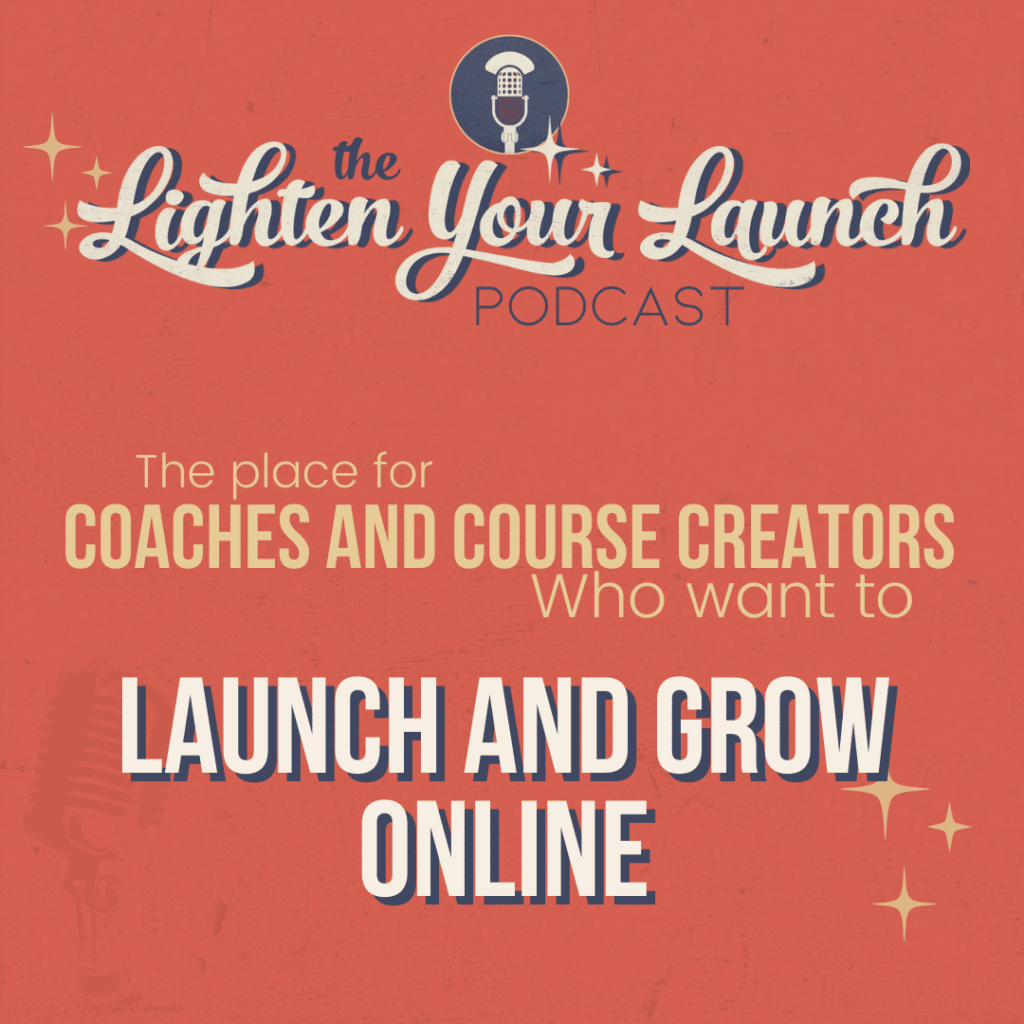
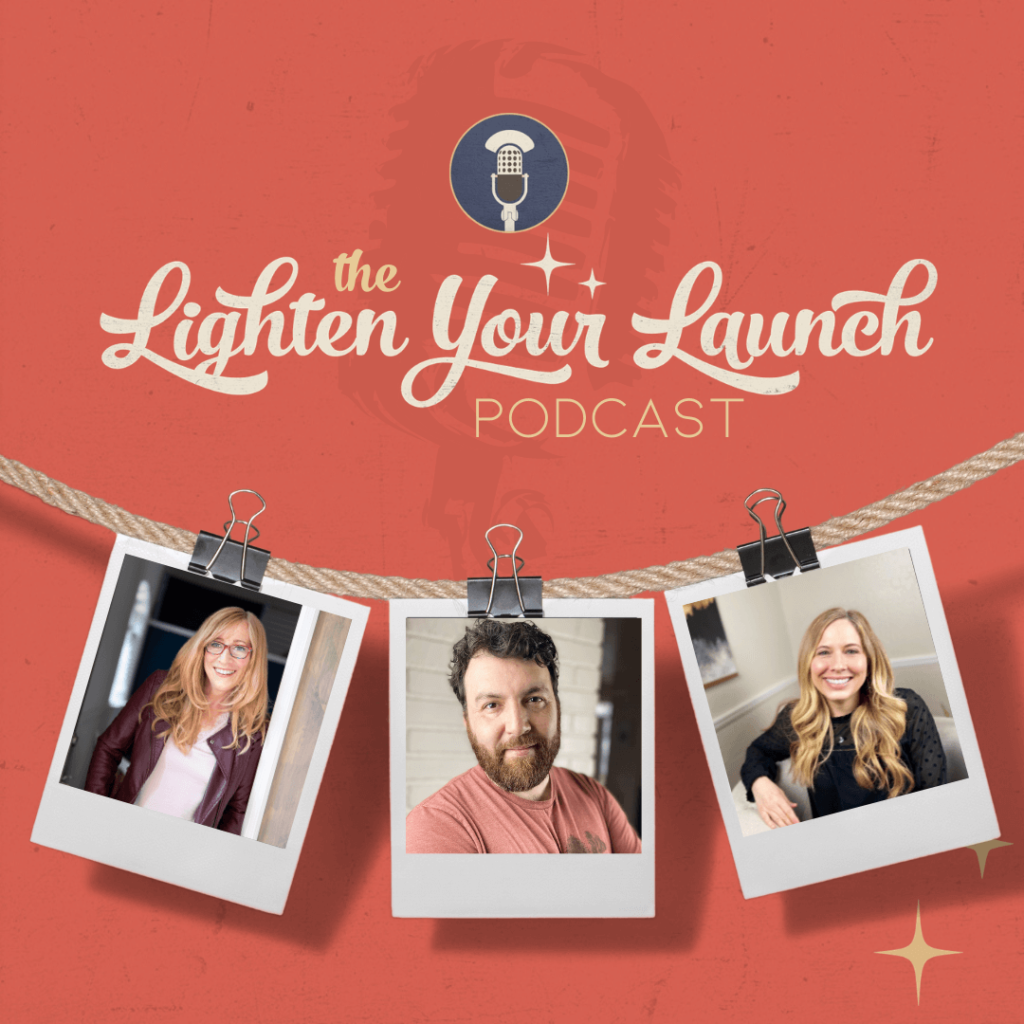


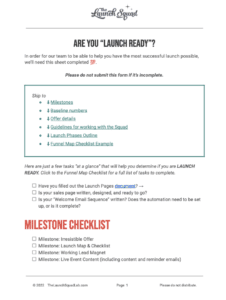
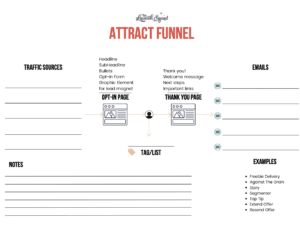
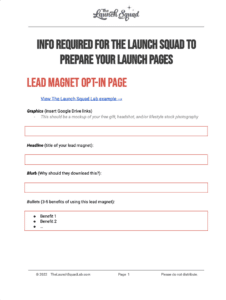
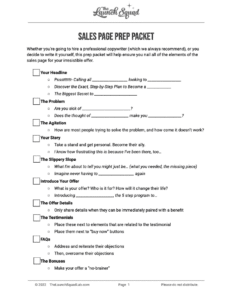
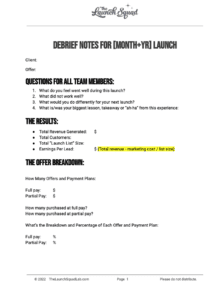
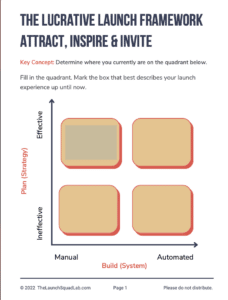
![Marketing Launch Calendar [TEMPLATE]](https://thelaunchsquadlab.com/wp-content/uploads/2023/05/Marketing-Launch-Calendar-TEMPLATE-300x260.png)
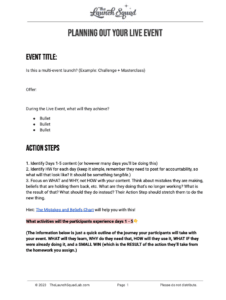

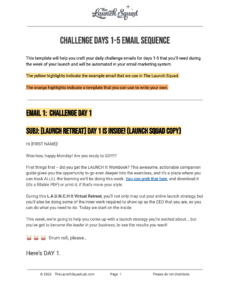
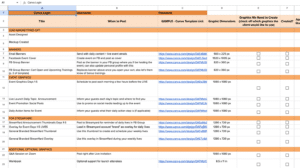
![[Updated] Email Templates for Launch](https://thelaunchsquadlab.com/wp-content/uploads/2023/05/Updated-Email-Templates-for-Launch-223x300.png)
![[REVISED] LS Pitch Script](https://thelaunchsquadlab.com/wp-content/uploads/2023/05/REVISED-LS-Pitch-Script-2023-226x300.png)

